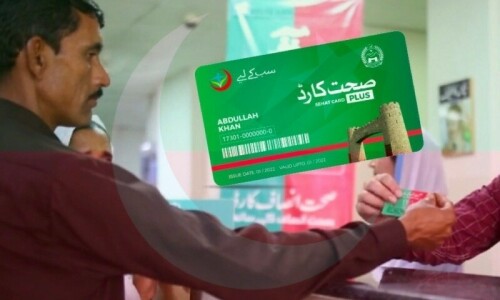PESHAWAR: The Khyber Pakhtunkhwa caretaker government has decided to put an end to the entitlement of the entire population of the province to full free treatment on Sehat Card Plus.
The government has decided to provide cashless healthcare services to only 65 per cent residents of the province while the remaining will have pay a certain portion of the amount spent on their treatment under the programme.
Prof Riaz Anwar Khan, the adviser to chief minister on health, told a press conference here on Thursday that the decision approved by cabinet was meant to benefit poverty-stricken people with Rs31, 373 monthly income as per the data of Benazir Income Support Programme. He said that the remaining residents of the province would get the services through co-payment.
“It will bring sustainability to the programme, the annual cost of which has surged to Rs39 billion per month. Still, the government will incur Rs28 billion and the poor will get total free medication,” he said.
The remaining will avail the services through co-payment
Flanked by Health Secretary Mahmood Aslam Wazir and chief executive of Social Health Protection Initiative Dr Mohammad Riaz Tanoli, the health adviser said that it was the best programme but the government wanted to focus on the downtrodden. He said that the well-off people would pay certain amount of their treatment’s cost. He said that emergency services and secondary care would remain free for all.
“The number of private hospitals will come down while public hospitals will get priority. In each and every district, there will be at least one empanelled facility,” he said.
The health secretary said on the occasion that the free treatment programme was being further streamlined to ensure that the people got quality services free of cost. He said that monitoring system was being strengthened.
“It is not a deviation from the Universal Health Act because the whole population will benefit but those, who can afford, will contribute towards their treatment. Criterion for selection of hospitals for the SCP in backward districts has been softened,” he said. He added that some of the operations and procedures were restricted to public hospitals only.
As per the new formula, the government has decided to provide free health services to people on the basis of BISP’s quantiles 1, 2, 3, 4 and 5. Those falling in falling in the quantile-1, 2 and 3 will stand entitled to free services as opposed to 100 per cent population. The monthly income of the households in these three quantiles is Rs23,192, Rs29,049 and Rs31,373, respectively.
The ‘quantile-4’ consists of the families having a monthly income of Rs37, 643, forming 21 per cent population of the province. They will pay 40 per cent charges of treatment from their own pocket while the rest will be paid by the government. In this category, the number of people and households is 7,928,929 and 1,602,211, respectively.
The number of people in ‘quantile-5’ is 5,352,609 persons or 1,274,842 households, whose monthly income is Rs63,544. These people are 14 per cent of the total population of the province. They will pay 50 per cent of their treatment cost.
Sources said that the decision would save about Rs5 billion per year for the province. The programme will be put into practice with the help of National Database and Registration Authority (Nadra) and BISP.
So far, the government has spent more than Rs52 billion on providing cashless healthcare services to 2.3 million people of the province for which 1,139 hospitals have been empanelled in the country.
The SCP, a flagship programme of the previous Pakistan Tehreek-i-Insaf government, had a smooth sailing since its launch in 2016. In the first phase, three per cent population of the province in four districts was covered by the programme. It was subsequently extended to the entire population of the province in November 2019 in a phase-wise manner.
However, since the arrival of caretakers, the free health initiative continues to suffer. The programme has been suspended and restored on four occasions since May this year.
Published in Dawn, September 8th, 2023













































Dear visitor, the comments section is undergoing an overhaul and will return soon.